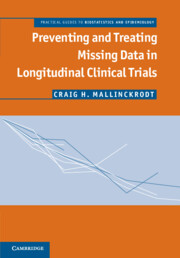Book contents
- Frontmatter
- Contents
- List of Figures
- List of Tables
- Acknowledgments
- Preface
- Part I Background and Setting
- Part II Preventing Missing Data
- Part III Analytic Considerations
- Part IV Analyses and The Analytic Road Map
- 9 Analyses of Incomplete Data
- 10 MNAR Analyses
- 11 Choosing Primary Estimands and Analyses
- 12 The Analytic Road Map
- 13 Analyzing Incomplete Categorical Data
- 14 Example
- 15 Putting Principles into Practice
- Bibliography
- Index
15 - Putting Principles into Practice
Published online by Cambridge University Press: 05 February 2013
- Frontmatter
- Contents
- List of Figures
- List of Tables
- Acknowledgments
- Preface
- Part I Background and Setting
- Part II Preventing Missing Data
- Part III Analytic Considerations
- Part IV Analyses and The Analytic Road Map
- 9 Analyses of Incomplete Data
- 10 MNAR Analyses
- 11 Choosing Primary Estimands and Analyses
- 12 The Analytic Road Map
- 13 Analyzing Incomplete Categorical Data
- 14 Example
- 15 Putting Principles into Practice
- Bibliography
- Index
Summary
Introduction
Missing data is an ever-present problem in clinical trials, which can destroy the balance provided by randomization and thereby bias treatment group comparisons. Data simulation has provided a powerful platform for comparing how well analytic methods perform with incomplete data. In contrast, methods of preventing missing data cannot be evaluated via simulation and actual clinical trials are not designed to assess factors that influence retention. Therefore, many confounding factors can mask or exaggerate differences in rates of missing data attributable to trial methods. Not surprisingly then, the literature contains more information on how to treat missing data than on how to prevent it.
In order to understand the potential impact of missing data and to choose an appropriate analysis, the mechanism(s) leading to the missingness must be considered. In longitudinal clinical trials, MCAR is not likely to hold, MAR is often plausible but never testable, and going beyond MAR to MNAR requires assumptions that are also not testable. Although some analyses are better than others in mitigating the problems caused by missing data, no analysis solves the problems. Even if bias is minimized, the loss of information can still be considerable.
- Type
- Chapter
- Information
- Preventing and Treating Missing Data in Longitudinal Clinical TrialsA Practical Guide, pp. 147 - 152Publisher: Cambridge University PressPrint publication year: 2013



